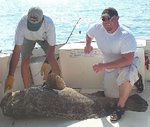Dealing with Sea Birds Stealing Your Bait and Getting Hooked or Tangled

If you fish in the Keys sooner or later you either hook or get a sea bird wrapped up in your line. Kelly Grinter, of the Marathon Wild Bird Center, consented to a short interview this morning to explain how to handle sea birds while fishing. When you hook a pelican or seagull just reel them in slowly and get control of them so you can remove the hook. Pelicans have large bills that make a perfect handle for holding them. Just grab and hold the top beak or both and gentlely control the bird.
Seagulls have smaller beaks but are handled much the same way. The first thing a seagull will do is try to bite you when you reel them in close. Just extend your finger and let gull bite then grab the top beak between your thumb and finger.
Once you have control of the bird remove the hook and unwrap and remove any fishing line. If the hook is buried to the barb, you may need to push the hook through and snip the barb off to get the hook out. Then release the bird. If the bird was hooked in the leg, it may need antibiotic treatment to prevent infection. In that case, give your local wild bird rescue center a call for more instructions.
In the photo Kelly has just removed a jig head from a juvenile pelican. She calls pelicans that hang out around the dock moochers because they are always looking for a hand out. While feeding these birds can be fun, it is one of the worst things you can do for them. Kelly said these pelicans are like 16 year olds that want a beer, they don't need to have a beer, but someone will give them a beer. So feeding pelicans is like giving alcohol to a minor, not a good thing.
Pelicans have eyes much larger than their stomachs. They will eat fish that are much too large for them to digest often ending up in trouble. So when you are cleaning fish make sure that the pelicans don't get to your fish or the carcasses. To my surprise, you may need to start watching out for your fillet knives as well.
"I got a call from one of the captains at Keys Fisheries that a pelican had swallowed his fillet knife. I drove down there knowing that could never have happened. The captain showed me the bird. When I reached my hand down its throat, sure enough there was the fillet knife," said Kelly.
So when you are fishing in the Keys watch out for the sea birds, especially the brown headed, juvenile pelicans. They are not the sharpest tacks in the box.
For more information on the Marathon Wild Bird Center follow this link, marathonwildbird.org
Marathon in the Florida Keys should be your next fishing vacation destination. Join us for charter fishing, fishing guide trips or our fishing 101 so you can fish on your own with better success.
Tight lines,
Capt. Dallas






Very nice thanks for sharing....................
ReplyDelete___________________
Smarry
The only Satellite Television Delivers the Best Value in Entertainment